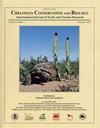Ontogenetic Niches and the Development of Body Shape in Juvenile Sea Turtles
IF 0.8
4区 生物学
Q3 ZOOLOGY
引用次数: 5
Abstract
Abstract Many marine organisms (invertebrates, fishes) produce large numbers of small offspring (larvae) that differ in appearance and behavior from adults. That outcome occurs because larvae as they grow occupy one or more ontogenetic niches that select for phenotypes that differ from those that promote adult survival. Our purpose in this study was to determine whether similar associations also occur in marine turtles. To find out, we examined relationships between juvenile appearance (body shape) and the ontogenetic niches occupied by 3 species of marine turtles: leatherbacks (Dermochelys coriacea) and 2 cheloniids (green turtles, Chelonia mydas; loggerheads, Caretta caretta). Our measurements indicate that juvenile body shape differs the least from adult body shape in leatherbacks and the most from adults in the 2 cheloniid species. We present evidence from other studies showing that juvenile leatherbacks occupy ontogenetic niches that resemble adult niches, whereas during their ontogeny, both juvenile green turtles and loggerheads make radical niche shifts as they transition between oceanic and neritic habitats. These results are thus consistent with the hypothesis that many morphological and behavioral characteristics expressed by juvenile marine turtles, like those of other larval forms, are best understood as evolved responses shaped by the characteristics of their ontogenetic niches.幼年海龟个体发育生态位与体型发育
摘要许多海洋生物(无脊椎动物、鱼类)会产生大量的小后代(幼虫),这些小后代在外观和行为上与成虫不同。之所以会出现这种结果,是因为幼虫在生长过程中占据了一个或多个个体发生生态位,这些生态位选择的表型与促进成年存活的表型不同。我们在这项研究中的目的是确定类似的关联是否也发生在海龟身上。为了找到答案,我们研究了幼年外观(体型)与3种海龟所占据的个体发生生态位之间的关系:棱皮龟(Dermochelys coriacea)和2种螯龟(绿海龟,Chelonia mydas;红海龟,Caretta careta)。我们的测量结果表明,棱皮龟的幼年体型与成年体型的差异最小,而两个螯类物种的幼年体型则与成年体型差异最大。我们提供了来自其他研究的证据,表明幼年棱皮龟占据着与成年生态位相似的个体发生生态位,而在它们的个体发生过程中,幼年绿海龟和红海龟在海洋和浅海栖息地之间过渡时都会发生彻底的生态位变化。因此,这些结果与以下假设一致,即幼年海龟表达的许多形态和行为特征,与其他幼虫形式的特征一样,最好被理解为由其个体发生生态位特征形成的进化反应。
本文章由计算机程序翻译,如有差异,请以英文原文为准。
求助全文
约1分钟内获得全文
求助全文
来源期刊
CiteScore
1.70
自引率
14.30%
发文量
17
审稿时长
>12 weeks
期刊介绍:
Chelonian Conservation and Biology is a biannual peer-reviewed journal of cosmopolitan and broad-based coverage of all aspects of conservation and biology of all chelonians, including freshwater turtles, marine turtles, and tortoises. Manuscripts may cover any aspects of turtle and tortoise research, with a preference for conservation or biology. Manuscripts dealing with conservation biology, systematic relationships, chelonian diversity, geographic distribution, natural history, ecology, reproduction, morphology and natural variation, population status, husbandry, community conservation initiatives, and human exploitation or conservation management issues are of special interest.

 求助内容:
求助内容: 应助结果提醒方式:
应助结果提醒方式:


